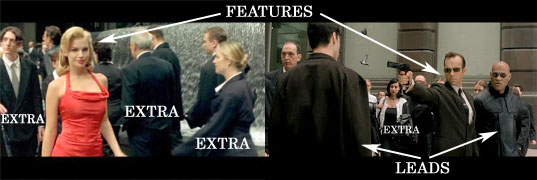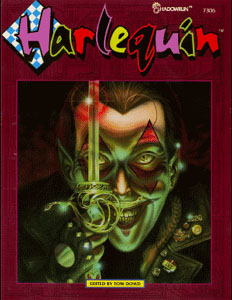Go to Part 1
Now that you know what the scene is about and the bang you’re using to launch it, you need to fill it with content. (Although, to be fair, the distinction we’re drawing here is not a hard-and-fast one: By the time you’ve set the agenda and the bang of a scene, you probably already know a lot about it.)
The process of filling a scene with content is an artistic one. And, like most artistic processes, there’s a virtually unlimited variation in the methods people use to do it. I’m not even particularly consistent in how I approach it and I actually think it’s a mistake to treat it as something that can be hard-coded. So I’m going to toss out a whole bunch of ideas that I personally find useful. Maybe you’ll find them useful, too. But regardless of that, you should poke around and see what other people have to say about it. And you should give yourself permission to experiment and really play around until you start getting a feel for what works for you and for your players.
First, however, there’s an all-important maxim:
You may know where the scene begins, but you don’t know where it ends.
You’re not writing a book or filming a movie. Unlike a traditional author, you may know where you’re starting off, but you’ve got no idea where the journey will end. Viewed from one perspective, this is a major limitation. But if you look at it from another angle, it’s a major opportunity.
ELEMENTS OF A SCENE
Here’s my basic philosophy: Take all the elements of the scene – the who, what, where, when – and fill those elements with all sorts of toys that both you and the PCs can play with.
(You could also think of these as “tools” that you use to build the scene. But, personally, I find the imagery of the toy – a thing which is meant to be played with; which becomes the focal point for a liberated imagination – to be far more evocative and, thus, useful.)
Hand-in-hand with this philosophy is the idea that the more flexible these toys become the more useful they will prove. If you include something which only has a single utility, that’s pretty good. But if you include something that can be used eight different ways, then you’re really cooking with gas.
(The good news is that your players are probably a gaggle of creativity: If you let them, they’ll take even the most boring stuff and spin it in ways you never imagined. But the key here is if you let them: Remain open to the players twisting or even completely inverting the people and things you include in the scene. Don’t let yourself get locked down on a preconceived notion of how things are “supposed” to work out.)
LOCATION: This is the “when” and the “where” of the scene. It’s the immediate environment for the actions of the scene and it can be either claustrophobic (“the back room at Bill’s”) or absurdly panoramic (“the highways of Texas”), depending on the nature of the scene and the characters in it. Ideally, remembering that minimizing contextualization makes for a better bang, you want to keep things short and sweet while simultaneously maximizing the number of toys that your players can grab.
A few rules of thumb that I use for crafting evocative descriptions as a GM:
Three of Five: Think about your five senses. Try to include three of them in each description. Sight is a gimme and Taste will rarely apply, so that means picking a couple out of Hearing, Smell, and Touch. (Remember that you don’t actually have to touch something in order to intuit what it might feel like if you did.)
Two Cool Details: Try to include two irrelevant-but-cool details. These are details that aren’t necessary for the scene to work, but are still cool. It’s the broken cuckoo clock in the corner; the slightly noxious odor with no identifiable source; the graffiti scrawled on the wall; the bio-luminescent fungus; etc.
Three-by-Three: Delta’s 1-2-(3)-Infinity talks about psychological research demonstrating that repeating something three times takes up the same space in our brains as repeating something infinitely. Thus, once you’ve hit the third item in a sequence, any additional items in that sequence are redundant.
Extrapolating from this, for minor scenes you can describe three things each with a single detail. At that point, you’ve filled up the “infinity queue” in your players’ brains and their imaginations will impulsively fill in the finer details of the scene you’ve evoked. For “epic” scenes, use the full three-by-three: Describe three different elements with three details each.
CHARACTERS: This is the “who” of the scene. I find it useful to conceptually break the characters present in a scene down into three categories: Leads, Features, and Extras.
Leads are the major characters in the scene. They’re the characters who are most affected by the agenda of the scene or who are capable of having the greatest impact on the agenda of the scene.
Features are the supporting cast of the scene. They wield an influence over the Leads; or provide crucial information; or are important resources in whatever conflict is being fought.
Extras are scene-dressing. They might find themselves being taken hostage or appealed to for mob justice, but they can usually just be thought of as part of the location instead of as active agents in the scene.

PCs in a scene are almost always leads. You may find it useful to think of some PCs as being the leads in the scene and the others PCs as features (because the agenda of the scene is primarily of interest to the former and of less interest to the latter), but if you’ve got a scene where none of the PCs are leads you might want to take a moment and triple-check what you’re doing. Unless you’ve got some amazingly good reason for side-lining the PCs, it’s probably a good idea to find a way of reframing the agenda of the scene.
(Off-hand, the only example I can think of is a situation where the PCs are deliberately not participating in a scene. For example, maybe they’re eavesdropping on a conversation. Although even then you should double-check and make sure that a secondary agenda in the scene isn’t about the PCs avoiding detection. And then triple-check to make sure that the scene isn’t really about something like, “Will the PCs stop Roberta from confessing her love to Charles?”)
CONFLICT vs. COLOR: The “what” of the scene is largely encapsulated by the agenda of the scene, but in actually running the scene I often find it useful to categorize the scene as either being primarily about conflict or primarily about color.
Conflict scenes are about two or more characters who want mutually exclusive things. The result might be a firefight, a formal duel, a boardroom takeover, a political debate, a psychic assault, or a torrid argument. Whatever form it takes, though, heads are going to butt and (in a roleplaying game) dice are probably going to be rolled.
Color scenes, on the other hand, are about exposition, planning, and/or preparation. They’re a time for character development; for showing what the PCs are like (and how they relate to each other) when fireballs aren’t flying at their heads. They’re the scenes when your crew studies the blueprints and calls in their favors. They also provide a valuable contrast – a negative space to highlight the positive space; a moment of calm to emphasize the frenetic chase.
From a purely utilitarian standpoint, color scenes are also where the facts get established which will allow you to minimize contextualization for later bangs. (For example, if you know a character’s long-lost brother is going to show up on their doorstep next week it’s more effective to seed information about the brother into a series of scenes leading up to that bang instead of trying to communicate the full meaning of the bang in the same moment that the brother arrives.)
With all of that being said, most of the time you’re going to want your scenes to be about conflict: Conflict is usually interesting and meandering exposition is usually boring, so try to find ways to build your exposition into conflict. (For example, you might have a scene where the PC’s mother is angry because she feels like the PC has stopped caring about his missing brother.) This frequently allows you to have your cake and eat it too.
Addendum: How NOT to Frame a Scene (Starring Harlequin)
Go to Part 4: Closing the Frame













